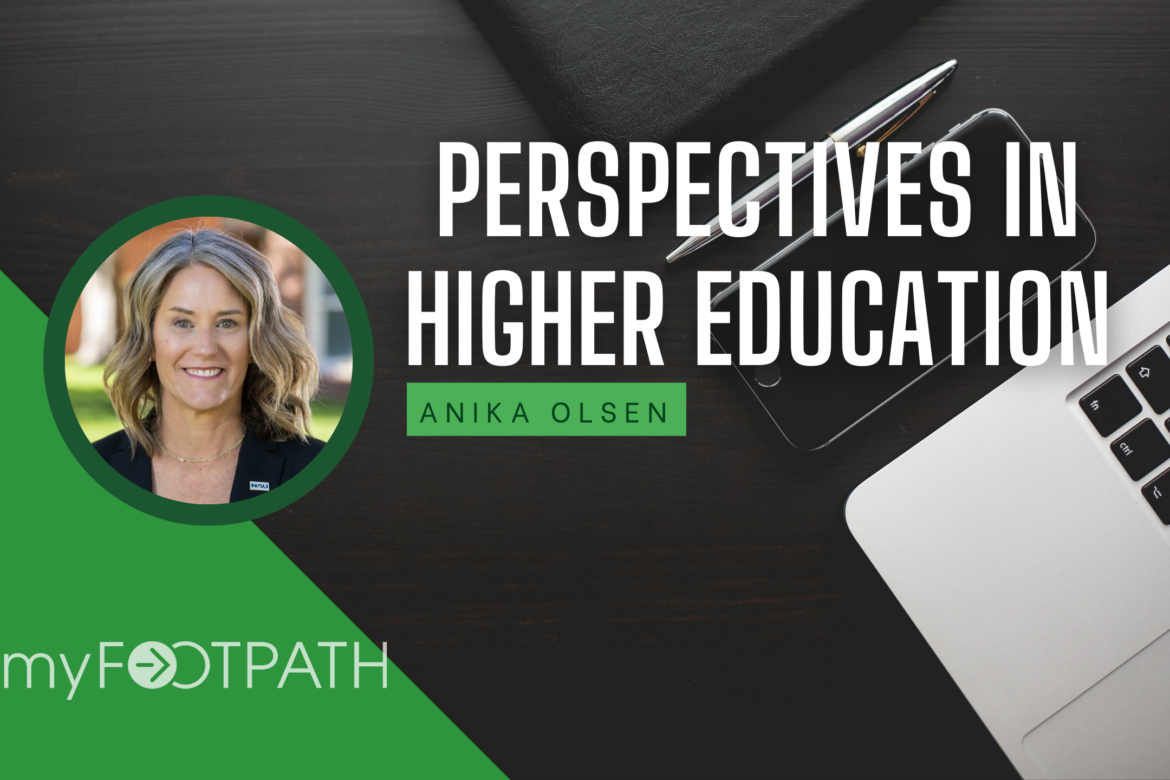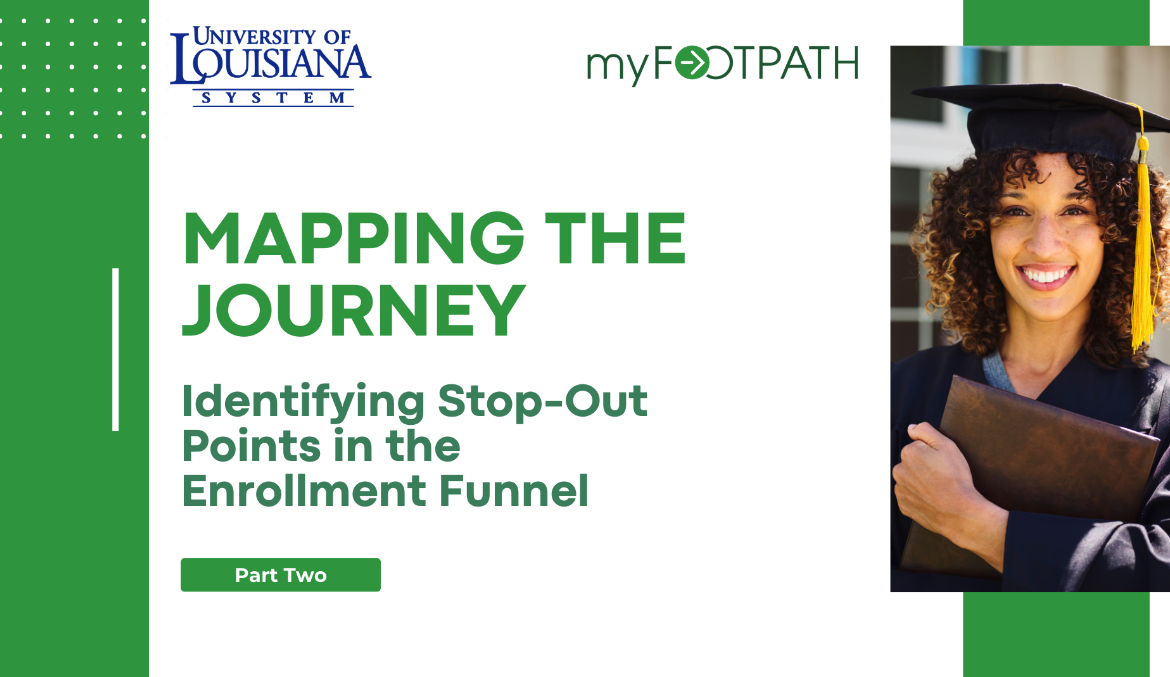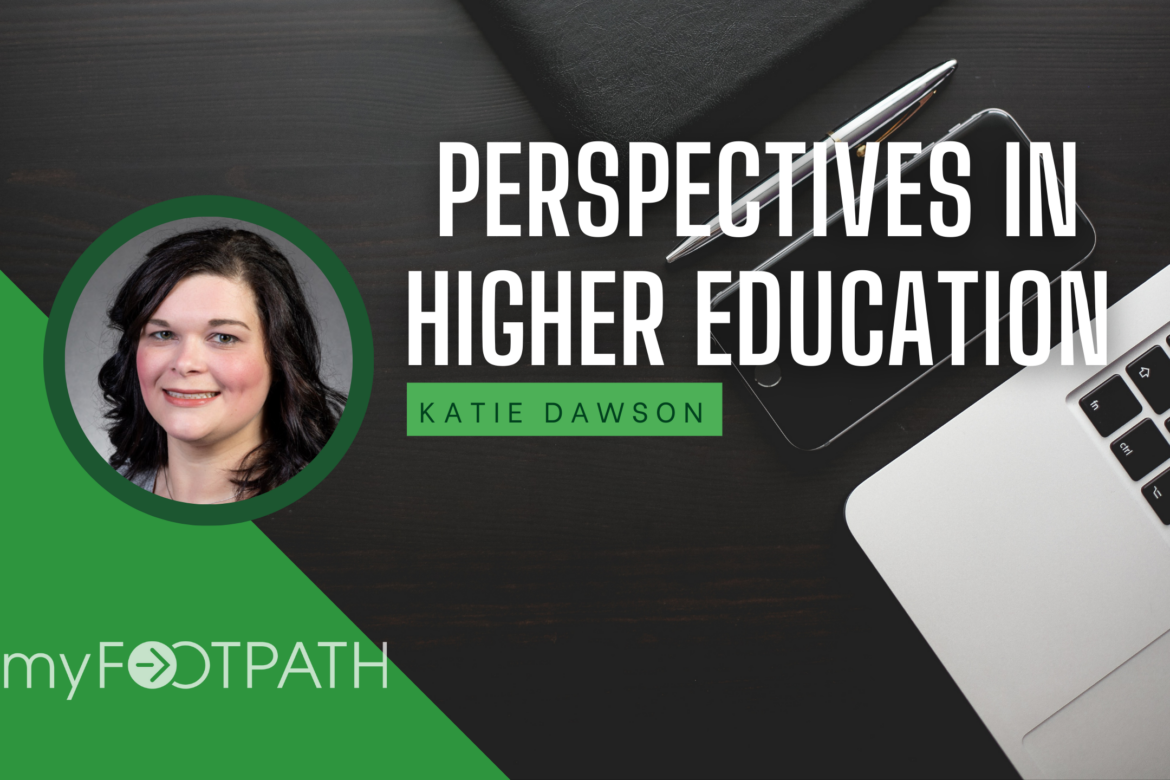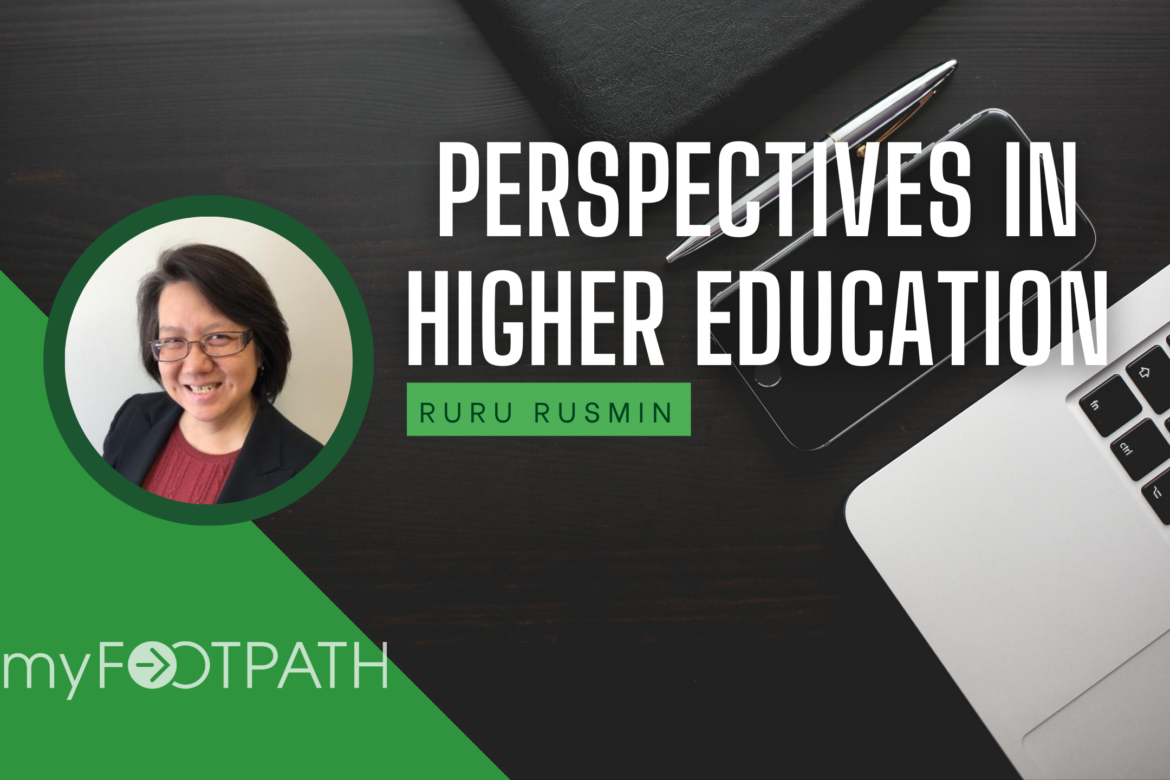Leveraging Insights and Institutional Data to Identify and ReEngage Your Stop-Outs
New Year, New Opportunities: Innovative Strategies for Universities to Boost Enrollment by ReEngaging Stop-Out Students By: Dr. Don Hossler
New Year, New Opportunities: Innovative Strategies for Universities to Boost Enrollment by ReEngaging Stop-Out Students
A Concerning Decline: Current Enrollment Trends
For most colleges and universities around the country, the census for the fall and spring enrollments are always critical times to increase university enrollment. A census tells you how many students are enrolled, which in turn determines the financial condition of the institution. Right now, at too many schools, the news is not good. While elite private universities as well as most public flagships continue to see high enrollments, regional public and private four-year colleges, as well as many community colleges, continue to see low enrollments. Enrollments are down not because of demographic trends, but because fewer students are going to college. In the fall of 2023, first-year students fell by 3.6%. Three years after the Covid-19 pandemic, Doug Shapiro, the Executive Director of the National Student Clearinghouse Research Center, has noted that there are more than 1 million fewer students enrolled in post-secondary education. The major cause of this decline is that fewer students are going on to college, instead they are seeking a “more direct link to the workforce,” such as career training and post-college employment. Although overall enrollment at community colleges has increased, it still lags behind pre-pandemic levels. Retention improved at both two- and four-year non-profit public and private institutions, but not enough to enable them to reach pre-Covid enrollment levels.The Importance of Retention and ReEngaging Stop-Out Students
As a result of these trends, colleges and universities must work harder not only to enroll new students, but also to retain currently enrolled students and reenroll both undergraduate and graduate students who have stopped out. In addition, they need to focus on students who applied and were admitted, but never enrolled anywhere. The objective is not to attract students with no prior connection to the university. Instead, the focus is on reengaging individuals who have previously shown interest in the institution, specifically those who either interrupted their studies there or who applied, were accepted, but did not initially enroll. Creating efforts to reenroll or reach students who did not matriculate anywhere, is no small task. These are populations of students to which traditionally two- and four-year colleges have not paid a great deal of attention. Many of these stop-out students are older students who were enrolled in on-line programs and admissions offices have not yet developed strategies to focus on these students. There is less research, and fewer lessons learned from experience to guide admissions offices. On top of that, for many admissions offices it was a bad time to take on new tasks because many offices were short-staffed as the result of burnout and resignations post-Covid. For too many colleges and universities, undergraduate enrollment management units often do not meet regularly with the units that manage online education. Cohesion between these two teams is crucial for finding effective and collaborative strategies. Many universities and colleges are beginning to consider the types of data necessary for effectively targeting 'stop outs' and 'never-enrolled' students in relation to the academic programs offered by the school. This includes evaluating how these programs are structured to better suit the needs of these specific student groups, resulting in a greater likelihood of them remaining enrolled.Key Strategies for ReEngagement
The strategies needed to reach these students are incremental and built upon one another. As universities and colleges, you need a thorough self-assessment of what you know about these students. If you lack the necessary data, you need to determine how you will collect it and from where you will obtain the information. Do you have staff in place with experience working with these kinds of students that can help develop effective recruitment strategies? Has there been adequate planning and a commitment of resources put in place to undertake these efforts? Another crucial element for successfully reenrolling students and attracting those who never enrolled is the support of senior campus administrators, with Chief Financial Officers (CFOs) playing a particularly important role. In periods of tight budgets, CFOs are tasked with cautious fiscal management, often leading to a careful evaluation before approving new expenditures. Given the historically limited focus on these student groups, additional resources are necessary to achieve the desired enrollment outcomes, necessitating strategic financial planning and support. The collaboration between enrollment managers, administrators overseeing online programs, and the CFO is often pivotal. It's essential for CFOs to have trust in and confidence in the expertise of these enrollment professionals.Case Studies of Successful University Enrollment and ReEngagement Campaigns
The national average of reenrollment rates is 2.1% but there is already evidence that enrollment strategies focused on reengaging stop-out students can be successful and go beyond the average. Working with Inside Track (a consulting organization), a program to reenroll adults who haven’t completed college degrees at Cal State University schools, has boosted reenrollment rates by 8.4%. Similarly, Northern Arizona University has collaborated with myFootpath in the Operation ReEngage program, achieving remarkable outcomes. To date, the initiative has seen over 2,544 students reenroll, with a significant 63% yield rate and a 75% retention rate semester-to-semester. Just alone from the Spring 2023 semester to Fall 2023 semester they saw roughly a 13% increase in enrollments. Impressively, the program's success has not only supported students' educational goals but is also projected to generate over $21.3 million in revenue for the institution, based on NAU's historical retention and graduation rates. Click here to read more about NAU enrollment case study.Final Takeaways
In the late 1970s and 1980s college enrollments were predicted to decline dramatically due to declining numbers of high school graduates, however enrolments went up due to colleges and universities effectively reaching out to adult students. In addition to the current decline in enrollment rates of students, we are only two years away from the demographic cliff, where the number of high school graduates will begin to decline precipitously. It is possible that shifting focus to reenrolling 'stop outs' and those who never enrolled could help maintain the requisite number of students with post-secondary education, essential for keeping our economy on stable footing, and simultaneously contribute to the financial stability of colleges and universities. Ready to transform your institution's enrollment strategy? Contact us today for a personalized consultation on reengaging stop-out students and enhancing your enrollment numbers.Webinar 3 Overview: Innovate, Inspire, Succeed
With millions of students stopping their college journey every year, Anika felt the impact on her own campus. As Vice President of Northern Arizona University, it was Anika’s mission to bring back stop-outs, but she lacked the institutional staff and resources needed to widen the net and really hone-in on the needs of these students. So, she partnered with those who could.
Anika, who now has nearly 2,500 students coming back for the fall semester, will highlight and share data from her partnership with myFootpath—exploring the techniques that enhanced retention rates and raised revenue for her university. Lead by Dr. Gerry Hanley, Director at the Center for Usability in Design and Accessibility, this webinar will guide you through every step of the process, showing you how myFootpath identified eligible students, reduced barriers and limitations, and increased revenue for the university—without the school lifting a finger. With myFootpath doing the grunt work, you’ll bring back students without building internal capacities, increasing revenue and creating a duplicable system that boosts retention year after year.
To access the complete recording of our second webinar, "Innovate, Inspire, Succeed: Trailblazing Strategies for Enrollment Growth" simply click here. Additionally, for an in-depth exploration of insights from Anika Olsen, be sure to read our "Perspectives in Higher Education" blog by clicking here.
Interested in our stop-out webinar series? Click here to watch the recording of our first webinar, "Decoding Stop-Outs: Unveiling the Hidden Demographics," and click here to watch our second webinar, “Mapping the Journey: Identifying Stop-Out Points in the Enrollment Funnel.”
Perspectives in Higher Education: Anika Olsen
Educational institutions are dedicated to ensuring students not only graduate but also transition into sustainable, meaningful employment. However, the reality is that some students may temporarily halt their academic pursuits, posing a challenge for institutions in reengaging and supporting their success.
Bringing a compelling real-world success story, we are delighted to introduce Anika Olsen, the Vice President of Enrollment Management at Northern Arizona University, who will unravel the remarkable journey that brought back an impressive 2,500 students within a mere three and a half years, all through their partnership with myFootpath. In this exclusive session, Anika will impart her valuable insights, shedding light on the effective strategies that drove this achievement, all without the need for extensive internal staff capacity. Through this partnership with myFootpath, Northern Arizona University witnessed a significant 3% annual increase in enrollments, backed by a proven framework for reengaging with stop-outs. When the time came to transition these strategies in-house, NAU was well-prepared for the task, setting a remarkable example for other institutions.
With over 25 years of experience in higher education, Anika Olsen brings a profound understanding of the inner workings of educational institutions and the crucial role that student services play in fostering success and a sense of belonging on campus. Her extensive background as a consultant for EAB Enrollment Services has allowed her to advise some of the nation's most esteemed colleges and universities on improving and modernizing their operational and recruitment strategies.
Leading this enlightening conversation is Gerry Henley, a seasoned professional who formerly served as the Assistant Vice Chancellor of Academic Technology Services at California State University.
Gerry: When it comes to re-enrolling students, it's important to recognize that their needs and circumstances differ from those of entirely new students. The challenge arises in seamlessly integrating these new requirements and responsibilities into an organization that may not have been initially prepared or established specific processes for re-enrollment. How do you effectively navigate this transition?
Anika: Great question, and it didn't happen overnight. I would say it's something we're still working towards. So we began this partnership in the later part of the fall of 2019, and we didn't have any staff team that was like, oh, pick me, I want to do all of this work. It really required us to look internally into enrollment management in our one-stop as well as our admissions processing team. We then had to explain the need to that group and then reach out to advising, the registrar's office, and academic affairs to make sure courses were offered when students wanted to re-enroll. And so it truly, truly was a cross-divisional effort and thankfully colleagues at NAU understood that this was a population that we had a moral obligation to go back to and give them a pathway and an on-ramp back to the institution.
Gerry: You said that it didn't happen overnight, but from what I've learned about you, it happened pretty fast. In terms of higher education's timeline, do you want to talk about the benefits of the ReEngage NAU results? They really are amazing.
Anika: Yeah, I'm very proud of these results. You can see the number of students impacted by our fourth year is over 2,500, which is phenomenal. We're a campus of just over 28,000 grad and undergrad online students. And when we began this effort, we kind of assumed that a lot of students would be going back via online learning, and that's true. But we also found that initially, a lot of students wanted to be back on the main campus or in one of the Arizona statewide campuses. Certainly, re-enrolled students bring revenue to the institution and that certainly has been amazing, especially in the last couple of years.
I'll also say it did happen a little faster than we thought, but we also had very willing leaders ready to champion this work. The way this partnership is designed, it's not for myFootpath to do it forever and ever for NAU. It's to teach us along the way through the partnership to build that capacity. And so when we've had employees leave or move on to other opportunities, we've been able to think, okay, now planning ahead, do we want to reallocate this position to this effort knowing that in another year, year and a half, two years, we are going to be taking this work back? And so those have been awesome discussions amongst leadership across campus where we're examining and trying to find efficiencies in our own system, which the myFootpath team has been very helpful with.
Gerry: That's just wonderful. When you look at it, you have to think of it like an investment. Look at the return on the investment that you’ve made, you've gained almost 2,500 students—that's almost a 10% increase in enrollment. And any campus would go wild about that type of increase and the funding. Now that's the outcome that we all would like to achieve. Now, do you want to give us a little background on how you made this happen?
Eager to learn more about the solutions that helped NAU bring back over 2,500 students? Watch the full recording for webinar 3 to dive deeper into the strategies universities can adopt to dismantle barriers and guide students toward graduation.
Webinar 2 Overview: Mapping the Journey
Universities can create a clear path towards graduation, but there are always students who drop out of the funnel—students who had high hopes and big dreams, who year after year, wait for the right moment to jump back in and finish that degree. For universities, tracking and re-connecting with these students can be monumental for retention rates, but re-enrolling these students starts with understanding why they left.
For the second webinar in our series, Katie Dawson from the University of Louisiana System is here to dive into the four main barriers that are holding back your students. From institutional hurdles to situational obstacles, Katie will map out the main stop-out points that are backed by research—giving your university an inside look at the lives of these students and how you can create support systems to get them back in the classroom. Having helped over 27,000 students resume their college journey, myFootpath is teaming up with Katie to discuss how you can do the same through partnerships that drive enrollment and bring back stop-outs.
To access the complete recording of our second webinar, "Mapping the Journey: Identifying Stop-Out Points in the Enrollment Funnel," simply click here. Additionally, for an in-depth exploration of insights from Katie Dawson, be sure to read our "Perspectives in Higher Education" blog by clicking here.
Interested in our stop-out webinar series? Click here to watch the recording of our first webinar, "Decoding Stop-Outs: Unveiling the Hidden Demographics," and delve deeper into Ruru Rusmin's work by clicking here.
Perspectives in Higher Education: Dr. Katie Dawson
It is with great pleasure that we introduce Dr. Katie Dawson, the Assistant Vice President for Academic Innovation and Learning at the University of Louisiana. Dr. Dawson's extensive experience spans both on-campus and state-level systems within Louisiana, making her a valuable source of insights. Her expertise in re-enrollment and support strategies for students who have temporarily halted their education is invaluable, offering a roadmap for their successful return and contribution to the state. Her passion for innovation and deep understanding of student support systems align seamlessly with the data-driven approach emphasized by myFootpath.
Dr. Dawson is deeply passionate about the subject matter at hand. In Louisiana, she has been instrumental in implementing the Compete Louisiana program, designed to re-engage adults who possess some college experience but lack a completed bachelor's degree. Within this initiative, Dr. Dawson's success coaches play a pivotal role in collaboratively charting personalized pathways for these students' return to higher education.
A fundamental aspect of success lies in comprehending the unique characteristics of your student population. In the context of Compete Louisiana, these individuals typically boast 60 to 70 credit hours when considering their return, often juggling full-time employment, familial obligations, and community responsibilities. Dr. Dawson's profound understanding of the demographic is central to guiding them forward.
When considering the broader context of adult students, it becomes evident that four distinct barriers to reentry persist among this demographic. What has notably intrigued Dr. Dawson during her research and engagement with this program is the observation that the measures taken to address the challenges faced by returning adults can also have positive implications for traditional students.
Katie: The first barrier I'd like to discuss today is what we call "dispositional barriers." These are internal obstacles that reside within the student themselves, primarily tied to their perceived competence level and self-efficacy. Stop-out students often carry a history of attempting to return to education, only to fall short of earning a bachelor's degree. Within them, a lingering seed of doubt persists, questioning whether this time will be any different. As practitioners, recognizing and comprehending these dispositional barriers is crucial. By actively working to bolster the confidence of these students throughout their academic journey, we can significantly improve our chances of retaining them.
The second type of barrier that we typically encounter is what we call "situational barriers." These barriers encompass a wide spectrum of life events, ranging from joyous occasions like marriages, the arrival of new babies, and landing new jobs, to more challenging experiences such as job losses, bereavement, and illnesses. In these instances, as an institution, there may not be much we can do to prevent these life circumstances from occurring in our students' lives. However, what we can control are the processes and policies we have in place to support students when life events become barriers to their education.
Gerry: Thank you so much, Katie. One of the things I'm hearing is that your first two barriers are focused on finding compassion for your students, understanding their circumstances, and then finding ways to address those concerns as an institution. It's a pretty complex system that you're trying to juggle. I know from a state institution and community college perspective, we often struggle to know how to address all of these different barriers. When we don't have a lot of time or staff, where would you recommend we prioritize our efforts?
Katie: For me, it always starts with relationship building. You have to reestablish that relationship with the student and regain their trust, being upfront when you don’t have all the answers or when the school is still working to address structural problems. What I tell my team all the time is that we're in the business of setting expectations. It doesn't mean that there won't be difficulty, but it means that you have somebody who's going to stick with you and help you navigate that difficulty as you move forward.
Gerry: It seems that your leadership is instrumental in guiding the various staff members who interact with re-enrolled students across different services. Effective communication of this message is crucial.
Katie: Absolutely. I'm very lucky to be one of many great leaders within our system who have their eye on the prize of student success and student engagement. And so I think that if we work together, which we'll talk about in a little bit, there's a lot more that we can accomplish than just working as a team of one.
The third type of barrier I want to discuss is what we call "institutional barriers." It might sound a bit strange to say that I have a favorite type of barrier, but the reason I appreciate institutional barriers is that they fall within our control to change. These barriers are essentially obstacles that we, in higher education, often unwittingly create, making it more challenging for students to return.
The fourth barrier we often encounter is technology. The pandemic emphasized disparities in tech access, from internet infrastructure to hardware for online learning. Many adult students opt for online formats due to flexibility and affordability. We must prioritize digital literacy support, as some students may be entirely new to online courses. This means comprehensive orientations, early skill assessments, and resource assistance are crucial, even for seemingly basic digital skills.
Gerry: With all these barriers, you have a pathway that you can guide people through what we need to keep in mind.
Katie: I have some guiding principles that can frame our work and ensure that student success and access remain at the forefront of our efforts. Earlier this summer, my leadership team asked if there's a universal process that all institutions should follow to efficiently move students through and prioritize their needs. I pondered this question and explored various models. However, the reality is that there's no quick and easy fix for these challenges. If such a solution existed, it would already be widely known. I believe in the strength of diversity in our approaches to working with students because each student group is unique, and you are best equipped to engage them effectively.
Eager to learn more about the barriers holding back stop-outs? Watch the full recording for webinar 2 to dive deeper into the strategies universities can adopt to dismantle these barriers and guide students toward graduation.
Webinar 1 Overview: Unveiling the Stop-Out Demographic
Every student starts their college journey with their eyes on the prize—graduation. But for those who have faced one too many obstacles along the way, that journey may have been cut short. For universities, connecting back with these hopeful graduates can boost retention rates and enhance student success—but how do we reengage these students, and how do we break down the barriers keeping them from putting on that cap and gown?
In this webinar series, we’ll be diving into the leading practices, effective interventions, and successful support systems that bring back adult students and get them across that finish line.
Featuring our special guest Ruru Rusmin, the Assistant Dean of Faculty Development and Technology at CUNY School of Professional Studies, our first webinar will dive into the many ways she’s impacted retention rates at her own university and helped struggling students overcome roadblocks.
Gain a deeper understanding of where students are leaving the enrollment funnel and what obstacles are keeping them from finishing their degree. Addressing common roadblocks such as pace of learning, credit for prior learning, speed of admission, and student support systems, you’ll learn exactly where and how to spend your time and resources to make the biggest impact on stop-out re-engagement. Having re-enrolled over 27,000 students, myFootpath is helping your university reconnect with the nearly 40.4 million stop-outs through data, resources, and interventions that will bring them back.
To access the complete recording of our first webinar, "Decoding Stop-Outs: Unveiling the Hidden Demographics," simply click here. Additionally, for an in-depth exploration of insights from Ruru Rusmin, be sure to read our "Perspectives in Higher Education" blog by clicking here.
Perspectives in Higher Education: Ruru Rusmin
With over two decades of expertise in online education, Ruru Rusmin excels in seamlessly integrating technology into teaching and learning. Her passion lies in supporting students who may have paused their education but aspire to complete their degrees, facilitating access to sustainable job opportunities. Ruru's impressive knowledge and experience has left its mark at esteemed institutions like Hong Kong Baptist City University, the University of Hong Kong, Bergen County Community College, and Borough of Manhattan Community College. Currently, she serves as the Assistant Dean of Faculty Development and Instructional Technology at CUNY School of Professional Studies, playing a key role in developing and implementing successful strategies.
CUNY School of Professional Studies, one of 25 CUNY schools, was founded 20 years ago to serve working adults and employers. In 2006, it launched its first online bachelor's degree program and has since become a leading online education provider in the CUNY system, recognized by US News and World Report for top-ranked programs in psychology and business.
As we embark on the first installment of our stop-out webinar series, we're delighted to have Ruru Rusmin and myFootpath CEO J.T. Allen joining us to explore the data behind this often-overlooked demographic. Hosted by Gerry Henley, Former Assistant Vice Chancellor of Academic Technology Services at California State University, this discussion aims to uncover the hurdles these students face and explore the solutions offered by myFootpath.
Ruru: CUNY serves approximately 3,600 students across 26 undergraduate and master's degree programs. Our student body primarily consists of working adults, typically in their twenties, thirties, and forties, with the majority holding part-time jobs. Many are part-time students due to full-time work commitments, caregiving responsibilities, or other obligations. Notably, our demographics are predominantly female, a common trend in similar programs. Although we offer fully online degrees, the majority of our students are in the New York metro area and are familiar with the CUNY brand. While we have a diverse global student base, the local presence is strong.
When connecting to students through marketing recruitment, we want to make sure we’re meeting that particular population’s needs. We emphasize flexibility, affordability, and educational value. We also specialize in the busy adult learner, highlighting that we’re a good match for them. We have particular programs and approaches that are going to be a match for their needs. We should not perceive their journey as the standard path taken by recent high school graduates; instead, we should provide them with a distinct pathway to reconnection.
Gerry: With the significant number of students, how important is the data in helping you shape strategic priorities and develop strategies to support student re-enrollment and degree completion?
Ruru: We use data to look at where we want to strategically apply our efforts. We regularly access reports on the New York metro area, which are generated by the university. These reports provide us with valuable insights into the current job market, including in-demand skills, occupations with job openings, and degree preferences. So that's produced by the university and it gives us an insight into which occupations have openings, especially for current and upcoming graduates, as well as what skills people are looking for in the labor market.
This data enables us to focus our efforts effectively and tailor our approach to each student, building a case that ties degree or certificate completion to monetary outcomes. We also examine the data and establish partnerships with community colleges that have recently graduated students, alumni with degrees, and those who earned their associate’s degrees some time ago. We target these individuals and highlight the abundant opportunities in these areas if they choose to pursue a bachelor’s degree. Lastly, we utilize data regarding in-demand skills to ensure that our programs align with market needs.
Gerry: One of the key points you mentioned is the significance of offering high-touch services tailored to specific populations. I can relate to the challenges I faced in my previous role, where it was always a struggle to determine how to allocate staffing resources to ensure a high-quality experience that aligned with prospective students' schedules and needs.
Could you please share your insights on how you manage to maintain an efficient and cost-effective service within a state institution? Are there any best practices you can impart to us?
Ruru: I believe a key to success is being highly responsive to our students and staying attuned to their needs. For instance, one of the most valued aspects for our students is flexibility. This is not only something they express, but we also recognize its significance. Our programs are entirely online and fully asynchronous, although there are optional synchronous components available. Many students find this asynchronous flexibility crucial, as even mandatory synchronous meetings can create scheduling conflicts for them. Flexibility extends not only to course formats but also to the high-touch, personalized attention we provide, which our working adult students truly appreciate.
Many of these busy adult learners don’t have time to deal with a lot of heavy bureaucracy, so how do we identify the points in the student journey where bureaucracy is going to be a struggle? For example with the admissions process, you can look at that and identify where the bottlenecks are so we can address those pain points.
It ultimately boils down to targeting the students and being willing to explore innovative approaches. At our school, our attitude is always geared toward identifying areas of concern, listening to our students when they encounter difficulties, and initiating small-scale pilots to assess potential process improvements or solutions. These small experiments allow us to gauge outcomes. Returning to the overarching theme of data, we analyze the results, and if a strategy proves effective, we proceed with its implementation.
Eager to learn more from Ruru about the stop-out demographic? Watch the full recording of webinar 1 to dive deeper into the research and explore innovative strategies that successfully reengage stop-outs.
Some College, No Credential Population Increases to 40.4 Million
NSC recently reported that stop-outs are on the rise and now up to 40.4 million! A 1.4 million increase from the previous year. myFootpath is on a mission to bring these students back and ensure they graduate.
For the full article: "Some College, No Credential Student Outcomes" by the National Student Clearinghouse, click here.











